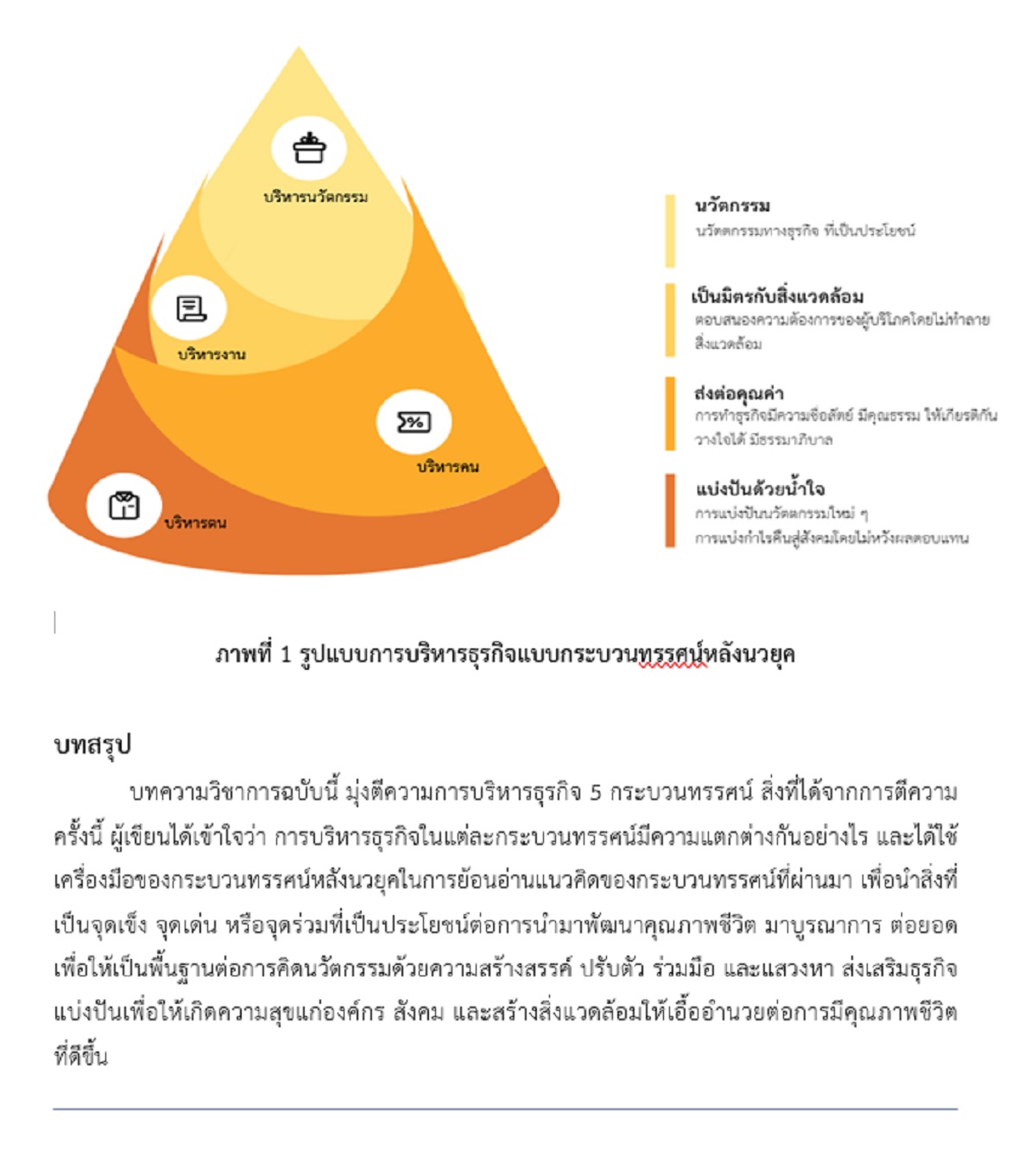Business Management : 5 Paradigms
Keywords:
5 paradigms, Business Management, BusinessAbstract
This academic article aims to explore the management of businesses through 5 paradigms, which include the primitive paradigm, the ancient paradigm, the medieval paradigm, the modern paradigm, and the postmodern paradigm. The study found that : Management of businesses through the Primitive Paradigm involves a focus on survival, primarily for self-preservation. For those with families, the business is seen as a means to ensure the survival of their own family only. Management of businesses through the Ancient Paradigm emphasizes the survival of the organization, with a focus on establishing clear and rigid rules within the organization. Decisions are made based on harsh realities, and behaviors or actions are measured and evaluated. Doing business in this era necessitates honesty and sincerity. Management of businesses through the Medieval Paradigm involves conducting business for the perpetuation of religion, essentially making it a religious enterprise. Even banks are seen as religious institutions, with all or nearly all profits being used to promote and support religious activities, broaden the reach of religion, and foster its development. Management of businesses through the modern paradigm does not consider beauty, goodness, or morality that could lead to blessings in the afterlife, as it doesn't believe in the existence of an afterlife that can be scientifically proven. Measures are taken to outmaneuver competitors using the principle of "Prepare for war in times of peace," thoroughly analyzing strengths, weaknesses, opportunities, and threats without reservation. Wealth is used to establish connections, strengthen power, attain prestige, and use these to ensure one's own and one's allies' stability. Management of businesses through the postmodern paradigm emphasizes businesses based on intellectual spirituality, such as creativity, adaptivity, collaboration, and requisitivity. This leads to entrepreneurial innovation, sharing, friendly relations with the environment, and addressing consumers' participatory needs to improve the quality of life for everyone.
References
กีรติ บุญเจือ. (2512). ปรัชญาเบื้องต้นและตรรกวิทยาเบื้องต้น. กรุงเทพฯ : ผดุงวิทยา.
จักรพงษ์ ทิพสูงเนิน รวิช ตาแก้ว และกีรติ บุญเจือ. (2566). วิธีการสร้างความสุขตามหลักพุทธปรัชญา. วารสารรัฐศาสตร์ มหาวิทยาลัยราชภัฏสวนสุนันทา. 6(1) : 74-84.
พนมพร เฉลิมวรรณ์. (2559). คุณลักษณะผู้ประกอบการกลุ่มเกษตรกรกาดน้อยเกษตรอินทรีย์ มหาวิทยาลัยแม่โจ้. สืบค้นจาก http://mdc.library.mju.ac.th/research/2561/panomporn_ chalermwan_2559/fulltext.p df
สุดารัตน์ น้อยแรม และกีรติ บุญเจือ. (2561). พระปฐมบรมราชโองการของพระบาทสมเด็จพระปรมินทรมหาภูมิพลอดุลยเดชกับประโยชน์นิยม : การศึกษาเชิงวิเคราะห์. รมยสาร. 16(3). (กันยายน - ธันวาคม).
Bentham, J. (1984). The Principle of Moral and Legislation. New York : Hafner Publishing.
Best, S. and Kellner, D. (1999). Postmodern Theory. New York : The Guilford Press.
Vatsyayan, K. (1986). Made easy ethics. New Delhi: Kedar Nath Ram Nath.

Downloads
Published
How to Cite
Issue
Section
License
Copyright (c) 2024 Institute of Sufficiency Journal

This work is licensed under a Creative Commons Attribution-NonCommercial-NoDerivatives 4.0 International License.



